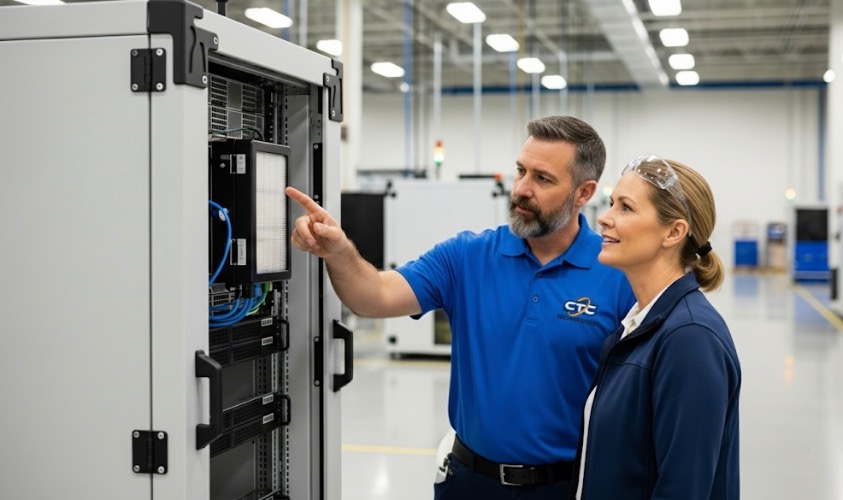Manufacturing downtime represents one of the most expensive operational challenges facing industrial companies today. According to Forbes, unplanned downtime can cost manufacturing companies a staggering $50 billion per year. More specifically, Siemens' True Cost of Downtime 2024 report found that the 500 biggest companies globally lose approximately $1.4 trillion annually due to unplanned downtime, equivalent to 11% of their total revenues.
For manufacturers, these aren't just statistics. In the automotive sector, an idle production line in a major plant costs up to $2.3 million per hour, or roughly $600 per second of lost productivity. The average manufacturing facility suffers 20 monthly downtime incidents, creating persistent operational disruption.
Despite these staggering costs, many manufacturing companies continue to struggle with traditional managed IT services providers (MSPs) who fail to understand the unique demands of industrial environments. Our more than twenty years of experience show us that the fundamental problem lies in a one-size-fits-all approach that treats a manufacturing plant like any other business office.
Why Manufacturing IT Environments Demand Specialized Expertise
Manufacturing environments present challenges that standard managed IT services consistently underestimate. Unlike office settings, industrial facilities operate under harsh conditions where dust accumulation, temperature fluctuations, and vibration from heavy machinery can quickly destroy conventional IT equipment.
Additionally, manufacturing operations frequently depend on legacy systems that have run successfully for decades. AS400 systems, for example, continue to serve as the backbone for many manufacturing operations, handling everything from inventory management to production scheduling. These systems require specialized knowledge that general-purpose MSPs typically lack.
Perhaps most critically, manufacturing environments have clearly defined operational priorities. When network issues arise, plant floor systems that control production equipment take absolute precedence over administrative functions like email or file sharing. Traditional MSPs often fail to understand these hierarchical requirements, applying standard troubleshooting procedures that may restore email functionality while leaving production systems offline.
Where Traditional MSPs Fall Short
CTC Technologies' work with manufacturing clients reveals that the fundamental failing of standard managed IT services providers stems from several critical misalignments:
Generic Equipment and Environmental Blindness
Most MSPs maintain standardized equipment catalogs designed for clean office environments. CTC Technologies has observed that when this equipment is deployed in manufacturing settings, it lacks the environmental hardening necessary for reliable operation. Server racks without appropriate filtration systems quickly succumb to dust buildup, while standard network equipment fails when exposed to industrial conditions.
Inadequate Emergency Response
On average, manufacturing downtime costs approximately $260,000 per hour, making immediate response critical. CTC Technologies understands that traditional MSPs operate on standard business hour support models with escalation procedures designed for office environments. When a production line stops unexpectedly, waiting for standard support queue processing can multiply costs exponentially.
Limited Industrial Knowledge
Standard MSP technicians receive training on general IT systems but lack expertise in manufacturing-specific technologies. CTC Technologies' experience demonstrates that understanding the interaction between plant floor control systems and corporate networks requires specialized knowledge that extends beyond traditional IT support.
The CTC Technologies Manufacturing-Focused Difference
CTC Technologies addresses these limitations through deep manufacturing industry experience and specialized service approaches that recognize the unique demands of industrial environments.
Environmental Specialization: CTC specifies industrial-grade hardware designed for manufacturing conditions, including server racks with specialized HEPA filtration systems, network equipment rated for industrial temperature ranges, and UPS systems that provide environmental monitoring capabilities alongside power protection.
Priority-Based Response Protocols: Understanding that plant floor systems take absolute precedence, CTC implements response procedures that prioritize production equipment restoration above all other concerns. Local technical resources can provide immediate on-site support during critical downtime events.
Integrated Lifecycle Management: Unlike traditional MSPs who coordinate with multiple vendors during emergencies, CTC's comprehensive service model includes equipment sourcing, configuration, and installation. This integrated approach eliminates delays during critical equipment failures.
Proactive Manufacturing-Specific Monitoring: CTC's monitoring systems track performance metrics specific to industrial environments, including environmental factors, power quality, and equipment health indicators that traditional MSPs overlook.
The Real Cost of Inadequate Manufacturing IT Support
The average cost for a large manufacturing plant due to downtime has reached $129 million annually—up 65% in just two years. This dramatic increase reflects not just direct production losses, but cascading effects including:
- Supply chain disruptions affecting downstream partners
- Emergency equipment replacement at premium prices
- Overtime labor costs to recover lost production
- Customer relationship damage and potential contract losses
- Regulatory compliance risks in time-sensitive industries
For manufacturers continuing to rely on traditional MSP approaches, these hidden costs compound over time, creating competitive disadvantages that impact long-term viability.
Strategic Questions for Manufacturing MSP Selection
Manufacturing companies should evaluate managed IT services providers with questions designed to identify genuine industrial expertise:
- What specialized equipment do you recommend for manufacturing environments?
- What is your guaranteed response time for production-critical issues?
- What experience do you have with legacy manufacturing systems?
- Do you maintain local technical resources for on-site emergency support?
- How do you prioritize plant floor systems versus administrative systems during outages?
The Partnership Approach to Manufacturing IT
The fundamental difference between successful manufacturing IT support and traditional MSP relationships lies in true partnership. Rather than applying standardized procedures, effective manufacturing IT partners understand that their success depends directly on their clients' operational success.
This partnership mentality drives specialized approaches to system design, maintenance scheduling, emergency response, and long-term planning—optimizing for uptime and operational efficiency rather than standardized service margins.
With UK and European manufacturers projected to lose more than £80 billion due to downtime in 2025, the choice of managed IT services provider represents a strategic decision that impacts every aspect of manufacturing operations. CTC Technologies' manufacturing-focused approach transforms managed IT services from a vendor relationship into a strategic partnership that directly supports manufacturing success.
Reach out to us today to learn more.

